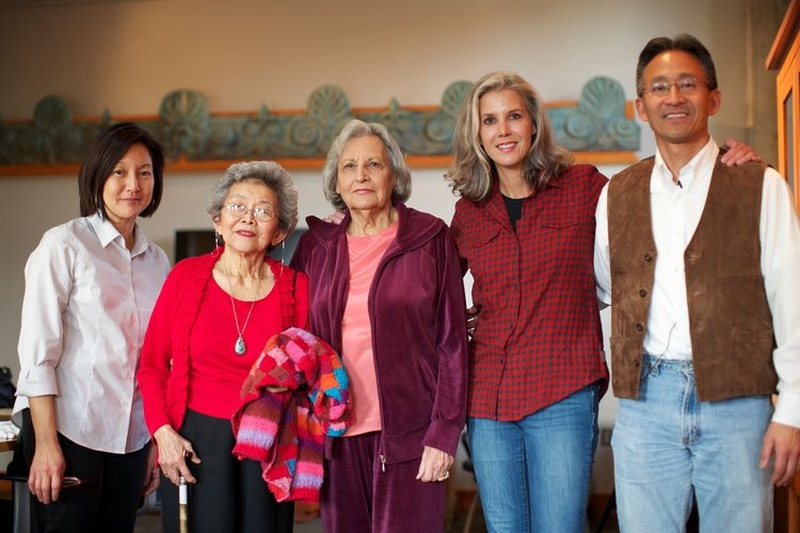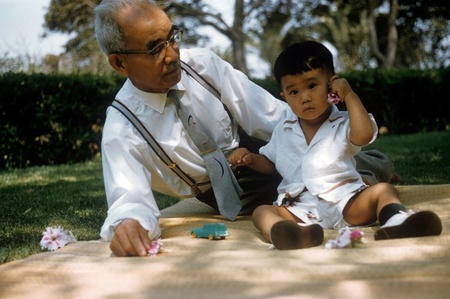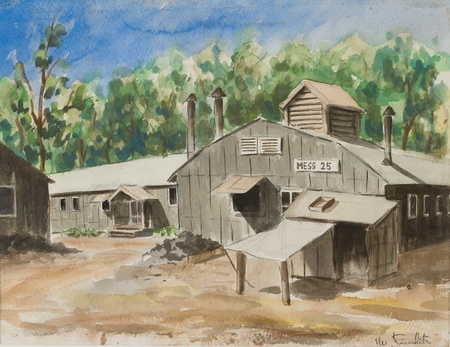Do you speak Japanese?
Alice Takemoto (AT): Just like a second grader. So when I went there, we were there for three months and we went to about seven different universities and since Ken couldn’t speak Japanese, so I spoke in my kitchen Japanese. You know, the immigration stopped at a certain point so the people didn’t come from Japan, so my mother and father’s speech is what they called the Meiji Era. So I learned the Japanese they spoke way back then and I’m using this language with the professors and they smile because it’s so quaint.
Paul Takemoto (PT): It would be like listening to someone speak English from a hundred years ago. Language is always evolving, it’s like going back in time. They must’ve been fascinated by that.
AT: They were fascinated.
So the house that was in the film at the very end–
AT: That’s where they [Alice’s mother and father] worked as domestics. That’s in Washington, D.C. It’s right on Beach Drive, and it’s quite a historic place, Peirce Mill. It’s on Rock Creek Park, and what they did is these barges would come up and they would get the rocks and they would grind flour there, it’s still a working mill. Then the same stone house is where my mother and father used to live, and another stone house is where the horses used to be and that’s now a gallery. Tilden Street is right in the middle there.
Mother was the cook, and Father cleaned this house. It was a doctor and his family, and they knew Mother and Father’s circumstances so they treated them very respectfully. Nine years they worked for them. And every summer they went to Nantucket. And days off they would pack a lunch and go to the beach and they had a nice time. So there were good moments in their retirement.
And they had a happy marriage?
AT: I think so. My mother apparently just saved one letter that my father wrote. And she gave it to me on one of the last trips so I kept it and I didn’t know what to do with it because I can’t read it. But she was describing it to me, kind of embarrassed because you know, Asian men don’t show their emotions to their wives.
PT: That was kind of broad statement though, Mom. [laughs] That encompassed a lot of people.
AT: She was trying to convey that father was showing his feelings and she was a little embarrassed about that. So I asked one of my musician friends who was raised in Japan and she’s only 70. She translated it and it was just very bland, nothing unusual. Then I sent it to this lady who taught at Mother and Father’s Japanese school so she was already in her 90s, Mrs. Nakajima. And she called me and she said it was beautifully written, a beautiful love letter. Apparently it was written in the classic style.
Oh, so your friend from Japan didn’t get the full effect or meaning.
AT: That’s why I want to get it translated.
PT: Is that what you had me print out the other day?
AT: That’s right.
PT: So this has been kind of eating at you, then.
AT: Yeah. Because I really want to know.
Did your friend, Mrs. Nakajima, allude to what it said?
AT: No because this was over the phone. So Father was a prisoner of war, and Mother was in a prison. I’m sure he didn’t know what his future was. That’s why I want to know what his feelings were because see, in that mug shot of Father [in the film], that was pretty horrible. He was 52, Mother was 44.
Wow, so he wasn’t a young man when this happened. That’s so hard.
AT: So you know, you wonder. My sister Grace said that he wanted all of us to go to Crystal City because then we’d be together. He didn’t know how long the war would last. But Grace said no she didn’t want to go, she wanted to go to college. So that ended that.
PT: Wait, when did he want you guys to go to Crystal City?
AT: Apparently when he was still in prison.
PT: And you were where?
AT: We were in camp too, must have been Jerome. Everything was so uncertain and then rumors flying, too. And the thing is that, when after Mother came back to camp from her trials, we were so wrapped up in day-to-day survival at the camp that I didn’t ask her anything about camp. And when Father came back from the prison, he came back in February and I left in August, I didn’t ask anything about what happened to him, either. Because I was all involved in my misery. So, it’s just, all that is lost.
PT: Also, those kinds of conversations would be difficult to have under any kind of circumstances but if you throw in certain cultural things–
AT: Yeah. And you know there were people who had a great time in camp because they knew everyone. My sister was working in the hospital in Santa Anita and they asked for volunteers to go to Jerome. This is why we went to Jerome. We didn’t know anybody else. So there I am, I was still 15 when I moved to Jerome. I didn’t know anybody and there’s no newspaper, no TV, no library, no nothing. So it was just very lonely. There was nothing about Arkansas that was positive. Nothing.
Paul, earlier you said that it affected all the siblings. What do you mean and what have you seen?
PT: Certain details like, Auntie Grace’s generosity. So these are just my impressions. The way she just gives, I don’t know, I couldn’t express. But I’ve always felt, even when I was a little kid that it was a result of the camps. And with our relationship [to Alice] you and me, remember you used to give me such a hard time about the way I dressed. Admittedly, I used have hair down to here, I used to cut sleeves off of everything. Flannel shirts, t-shirts.
AT: Really?
PT: And don’t you remember? We used to get into it! And you told me one time, ‘Someone meeting you may have never met a Japanese person before, so it’s all about an impression.’ Which gave me all the more reason to not dress nicely.
AT: Oh, really. I got that from my mother.
PT: And I remember one time you played in a concert in a very fancy house in Maryland and Auntie Mary was there, this was a while ago. There were all these chairs arranged. But that whole night Auntie Mary wouldn’t move. And she said something like, ‘I’ve never been in a house this fancy.’ She felt like she didn’t deserve to be there. And I grew up thinking women were stronger than men in terms of the absence of anger and self-pity. Absence of bitterness.
Whereas where we grew up in Maryland, there was this tight little group of Japanese American families. None of us had extended family, everyone had family back in California, so we became our own extended families. And a lot of the dynamics were the same. Like my father was in the 442nd, and Mr. Kobayashi was in the 442nd, and Mr. Ikari was in the 442nd. and all the wives were in camp. And the men were all these hard-ass, stubborn–
AT: Controlling.
PT: Controlling, short-tempered, held grudges. And the wives were the centers of these families. They were the glue and that’s an awareness I had when I was a tiny little kid.
AT: Because we know so many of the wives that are such wonderful people.
PT: Like the best people in my life, they made the biggest impact. And they’re all women. So I grew up thinking women are stronger than men.
PT: A quick thing about the resisters. This family Kobayashi, the Kobayashi parents, we would have Thanksgivings together, Christmas together, they were literally like second parents to me and I was closer to the parents than I was to my own aunts and uncles in California and Hawaii. The children are like, closer to siblings than cousins. We’re still close to them, both of the parents are gone now.
PT: Mr. Kobayashi had been in the 442nd, Mrs. Kobayashi was in Heart Mountain. And then there was another family, Ikari. Mr. Ikari was in the 442nd, he got shot. Bullet went through one leg and out and into the other leg, and Mrs. Ikari was she?
AT: Mrs. Ikari’s parents went to Crystal City but she as a high school kid went to Iowa.
PT: Right. So these guys went to see this movie, Rabbit in the Moon, it was like year 2000. And my father who had his own issues – in retrospect, he clearly had undiagnosed, untreated post-traumatic stress disorder. So he volunteered from Hawaii and he was a combat medic, and my father’s take on the resisters was that they were heroes. He told me that he thought it took more courage for them to do what they did than for what they did. He said, ‘I was just going along with everybody. Everybody was going into the army so I went into the army.’ Mr. Kobayashi and Mr. Ikari’s position was the typical, hard-ass, ex-442nd/100th guy and that those guys were traitors. So the three of them got into this huge argument.
And it basically was the fuel that killed these friendships. And we stopped having Thanksgivings together, and Christmases together and I remember my father telling me about this argument in the kitchen, and his hands are shaking, he was so mad. ‘These guys are heroes and they’re calling them cowards!’ This is how many years after the war’s over, it’s like it just happened. These resentments and anger was just right underneath the surface and all it took was this movie to spark it. I didn’t even know what a resistor was. I was like, what were the resisters?
AT: And he was in actual war for six months. Actual war. Dad was in full combat for six months and then he was in an army hospital for three months in Rome.
And he was deployed to which countries?
AT: Italy. You heard of the Triple V in Hawaii? These were college kids who volunteered, about 150 of them. And he was at the University of Hawaii when I think it was a Chinese Hawaiian man that came and said, ‘You guys want to show your loyalty, volunteer as a group.’ So that’s how that Triple V started.
PT: You know what’s funny, I was in junior high when I first heard the men in that outfit being described as heroes. And that was such a jarringly inaccurate word to me because all I knew was Dad, and these rages and then the silences. And there was nothing heroic to me about that. And the other men, and how messed up they were, they were just all screwed up. As you would be, these guys all pretty much grew up in poverty then they were in a war. How could that not screw you up?
PT: [To Alice] Just to me, your whole generation is a traumatized generation. The whole generation. Very few, if any, didn’t get out of it without some level of trauma. Even if you weren’t in a camp, even if you weren’t in a war, you’re part of that generation, you’re part of that basic human need to fit in, and you’re not fitting in. On a very basic intrinsic level. Your own government has determined that your entire kind needs to be locked up, needs to be put behind barbed wire. And that’s what fills me with rage about the current situation.
A warm thank you to Vivienne Schiffer for helping to coordinate this interview. Watch the trailer for Relocation, Arkansas here.
The audio from the interview:
* This article was originally published on Tessaku on December 16, 2017.
© 2017 Emiko Tsuchida









